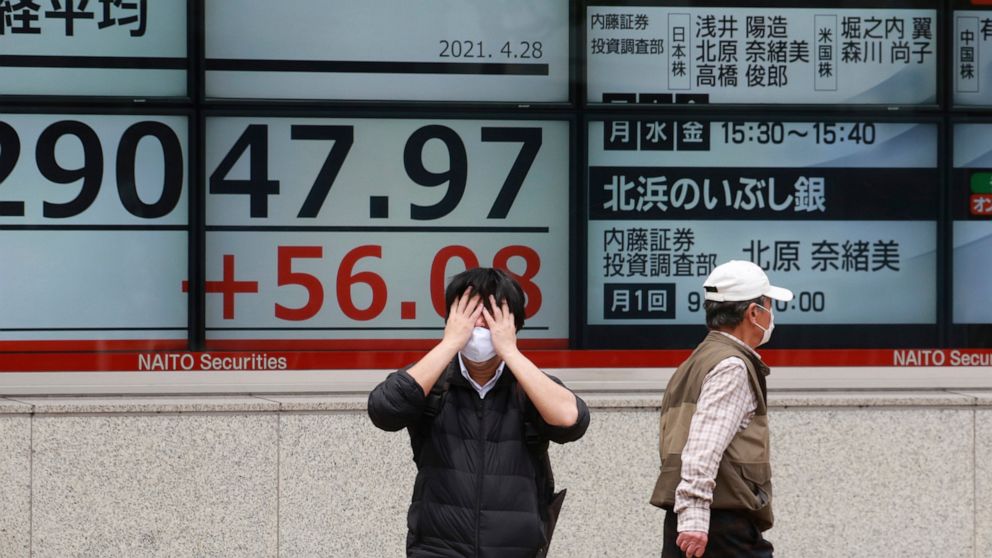Stock indexes slip after Federal Reserve leaves rates alone
Major U.S. stock indexes ended slightly lower on Wall Street after the Federal Reserve left its key interest rate unchanged near zero, even as it noted recent improvement in the economy
TOKYO — Major U.S. stock indexes ended slightly lower on Wall Street after the Federal Reserve left its key interest rate unchanged near zero, even as it noted recent improvement in the economy. The S&P 500 ended down just 0.1% after some earlier gains evaporated. Investors were also dealing with a wave of earnings reports from major U.S. companies and looking ahead to an evening speech from President Joe Biden to lay out his $1.8 trillion spending plan. Google’s parent company rose 3% after the online giant reported that its profit more than doubled as digital advertising soared. Bond yields held steady.
THIS IS A BREAKING NEWS UPDATE. AP’s earlier story follows below.
Major U.S. stock indexes were mixed in afternoon trading Wednesday after the Federal Reserve said it is leaving its key interest rate unchanged near zero, while noting recent improvement in the economy.
The S&P 500 was up 0.1% as of 3:15 p.m. Eastern, with gains in communication services, energy and financial companies outweighing a pullback in technology and health care stocks. The Dow Jones Industrial Average was down 112 points, or 0.3%, to 33,871 and the tech-heavy Nasdaq was down 0.1%.
The yield on the 10-year Treasury pulled back from earlier gains and was holding steady at 1.62%.
The central bank, which issued the policy update at 2 p.m. Eastern after a two-day meeting of its policymakers, said the economy and job market have “strengthened.” The Fed acknowledged that inflation has risen, but that it sees the increase as transitory. Signs of rising inflation, and the prospects of higher interest rates, have worried investors and helped fuel a rapid rise in bond yields from where they were at the start of the year.
The Fed also said that it would keep buying $120 billion in bonds each month to try to keep longer-term borrowing rates low.
“With no meaningful change to monetary policy or communication, this meeting was simply a message to market participants to sit back and observe as the economic recovery continues to unfold,” said Charlie Ripley, senior investment strategist for Allianz Investment Management.
The market welcomes the Fed’s decision to maintain its support for the economy and keep rates low, said Sylvia Jablonski, chief investment officer at Defiance ETFs.
“We don’t expect a rate hike until 2023,” Jablonski said. “This, I believe, is almost no news is good news for the market. Any rhetoric to act more quickly would have been an issue.”
Investors have a lot to digest Wednesday, apart from the latest Fed policy statement. Dozens of companies are reporting their quarterly results. After the closing bell, Wall Street will get reports from Apple, Facebook and Qualcomm. Wall Street will also have its eye on Washington, where President Joe Biden was due to give a speech laying out his policy agenda.
Google’s parent company, Alphabet. rose 3.8% after the company reported its profits doubled from a year earlier, helped by a surge of digital advertising revenue as more Americans shopped online during the pandemic. Visa rose 1.9% after reporting solid financial results.
Google’s solid gains helped send communications stocks higher. Oil prices rose and boosted energy company stocks. Those gains were offset by a downturn in technology and health care companies.
Spotify sank 11.5% after the music streaming company announced that subscriber growth had slowed more than expected.
Biotechnology company Amgen was among the biggest losers. It fell 7.2% after its first-quarter profits and revenue fell short of analysts’ forecasts. Investors punished several other companies that came up short with their most recent financial results. Boeing slipped 2.7%.
Also on tap for Wednesday is President Joe Biden’s speech to a joint session of Congress, which is expected to lay out several parts of his agenda such as increased infrastructure spending, likely higher taxes on the wealthy and higher funding for government programs. The $1.8 trillion program will also create universal access to pre-kindergarten schooling as well as provide support for child care programs.
![]()


